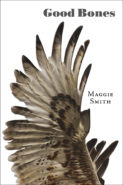
Review: Good Bones by Maggie Smith
Reviewed by Sarah Appleton

Good Bones
Poems by Maggie Smith
Tupelo Press, October 1, 2017
$16.95; 112 pp.
ISBN: 978-1946482082
“Let me love the world the way I love,” Maggie Smith says in “Rain, New Year’s Eve,” the final poem in Good Bones. This line encapsulates one of the central themes of the collection: loving the world and struggling to do so in a world so overrun with danger and hurt, a world that is often so difficult to love. Smith breaks the line there but goes on to elaborate that she wants to love the world as she loves her young son, which reveals another central theme: a mother’s love for her children and what it means to bring them into a difficult to love world.
In a culture where writing about motherhood is often deemed frivolous and dismissed as niche women’s literature, Smith proves otherwise. Nature and the passage of time—the hawk that flits through her poems, the sun that shines—are subjects canonical male poets have taken up, too. But by writing from her experience as a mother, Smith makes motherhood an essential component of understanding our relationship to the world. After all, a mother is always watching her child grow, a trajectory that, like the change of one century to another, can never be reversed. Her poems pose the question: how can she help her children live and survive in the world she’s brought them into?
“I’m desperate for you / to love the world because I brought you here,” she writes in “First Fall.” But she knows she must also teach the hard truths of this world she has brought them into; she must tell the stories we all remember being told about strange men offering us candy or asking us to help them find their puppy and then doing unspeakable things to our bodies. “I told my daughter the one about still loving / the world we live in,” she says in “Panel Van, “the world the man / lives in, lost. Yes, the same world.”
There’s a tension in Smith’s poems between looking back and moving forward. She writes of what it means to have been birthed in one century and survived it into another. While her feelings for the present are dark tinged, her feelings for the twentieth century aren’t pure nostalgia. “Twentieth century? Who am I kidding?” she asks in “Orientation.” “It was never safe.” She explains in “Twentieth Century,” “your horrors // were far away, and I thought I could stand them.” To have survived feels like a triumph, but it has not yielded a more amenable present. “There is no such thing as safety— / only survival and the absence / of survival,” she meditates in “Rough Air,” thinking back on an opera singer and her baby who perished when “a mountain chewed their plane / to bits.” Such violence—even in the face of motherhood—seems unnatural. “How is that possible?” she asks.
Both a surety and poignancy exist in Smith’s poetry, even as she takes up the smallest, seemingly most mundane details, like the curl of bark that falls from a tree. “I pick up a mottled cuff / and cup my wrist,” she states in “London Plane, “to show my daughter / how to wear it.” Nature becomes both plaything and functional, something for a mother to pass on to a daughter. But elsewhere, Smith is more urgent. She asks in “At Your Age I Wore a Darkness,” “What can I give you // that will be of use in your next life, / the one you will live without me?”
Ultimately, to love the world is difficult, it takes practice and reframing. In “Let’s Not Begin,” Smith considers:
If I list everything I love
about the world, and if the list
is long and heavy enough,
I can lift it over and over—
repetitions, they’re called, reps.
Loving the world, and in turn teaching her children to love it, takes strength and endurance; there’s the possibility of burnout. In the titular poem, she admits point blank,
I am trying
to sell them the world. Any decent realtor,
walking you through a real shithole, chirps on
about good bones: This place could be beautiful,
right?
And then she delivers the punchline, both suggestion and grasp at hope: “You could make this place beautiful.”
Sarah Appleton has work published or forthcoming in Michigan Quarterly Review, the Rumpus, the Ploughshares Blog, the Los Angeles Review, and Grist. She earned an MFA from Western Washington University. She teaches at Cranbrook Kingswood School, where she lives with a hundred girls, her husband, and their beautiful Australian Shepherd, Zoë. You can find her on Twitter @sarahkapples.

I was reading about Yeats, kept clicking here and there, and found this piece about Maggie Smith and her lovely poem Good Bones.
Never a mother, by choice, this poem just shocked me. Just what I needed after a rewatch of No Country for Old Men.